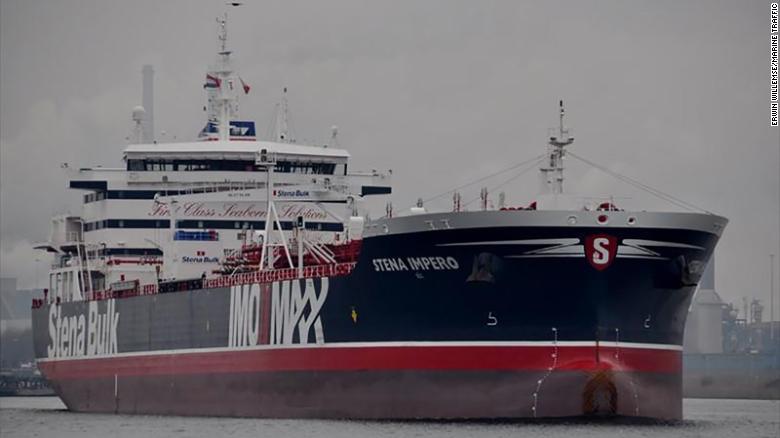
In an apparent retaliation of the capture of an Iranian oil tanker by Gibraltar, a British colony, Iran Friday (July 19) captured a British oil tanker.
Iran’s Islamic Revolution Guards Corps (IRGC) said in a statement on Friday that the vessel named “Stena Impero” had been impounded “at the request of Hormozgan Ports and Maritime Organization when passing through the Strait of Hormuz, for failing to respect international maritime rules.”
The oil tanker was transferred to the coast to undergo the required legal proceedings, the statement added.
The Northern Marine Management, which owns the Stena Impero, has said the vessel carried 23 crew members.”Northern Marine Management has not been able to establish contact directly with the vessel since it was notified of the incident at approximately 1600 Today, 19th July 2019,” it said in a statement.
An un-named Iranian official told the Iranian News Agency (IRNA) the ship had breached international maritime regulations by passing through a prohibited maritime passage in the Strait, turning off its tracking signals and ignoring warnings issued by Iranian authorities.
Iran’s Fars news agency said the Stena Impero was involved in an accident with an Iranian fishing boat and ignored its distress call.
“It got involved in an accident with an Iranian fishing boat… When the boat sent a distress call, the British-flagged ship ignored it,” the head of Ports and Maritime Organization in southern Hormozgan province, Allahmorad Afifipour, told Fars.
“The tanker is now at Iran’s Bandar Abbas port and all its 23 crew members will remain on the ship until the probe is over.”
According to Telegraph, tracking data showed the Stena Impero was in the same area that a United Arab Emirates-based vessel was detained on Sunday and where a British vessel, the British Heritage, was blocked by Iranian forces earlier this month.
Iran briefly captured another British oil tanker on Friday. Informed Iranian military sources were quoted by Press TV that the second British-owned Liberian-flagged tanker, the Mesdar, was allowed to continue its pre-scheduled course after “being briefed on the concept of innocent passage and observing environmental regulations”.
Gibraltar
The capture of British ship came two weeks after Gibraltar seized an Iranian vessel. Gibraltar
said the Iranian vessel, seized by marines in a daring landing in darkness off the coast of the British territory on July 4, was suspected of smuggling oil to Syria in breach of European Union sanctions.
Iran has repeatedly called for the ship’s release, denies the allegation that the tanker was taking oil to Syria in violation of sanctions and says Gibraltar and Britain seized the vessel on the orders of Washington.
Gibraltar denies that it was ordered to detain the vessel, which was carrying up to 2.1 million barrels of oil, but several diplomatic sources said the United States asked the United Kingdom to seize the vessel.
Reuters said the vessel is now seen as a pawn in the standoff between the Islamic Republic and the West, with its fate tangled in the diplomatic differences between the EU’s big powers and the United States.
“This tanker is important because it is part of the wider tensions between Iran and the United States,” Reuters quoted Sanam Vakil, senior research fellow at Chatham House in London as saying.
Jeremy Hunt
Jeremy Hunt, the Foreign Secretary, said he was “extremely concerned by the seizure of two vessels by Iranian authorities in the Strait of Hormuz”.
Hunt said he was attending a Cobra meeting to determine the UK’s response and what could be done to secure their release, adding that the seizures were “unacceptable”. He said it was understood there were no British citizens among the two crews.
“We remain deeply concerned about Iran’s unacceptable actions which represent a clear challenge to international freedom of navigation,” a Government spokesman said after the meeting.
UK vessels have been advised to “stay out of the area” of the Strait of Hormuz for an “interim period”, the spokesman said, adding: “As the Foreign Secretary has said, our response will be considered and robust and there will be serious consequences if the situation is not resolved.”
Abdus Sattar Ghazali is the Chief Editor of the Journal of America (www.journalofamerica.net)

No comments:
Post a Comment